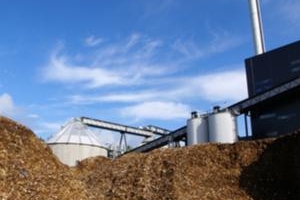How should NH respond to biomass closures in the North Country?

Biomass power plants are closing in the North Country. This impacts individual workers, the North Country economy, and potentially the forest landscape. How can—or should—the state respond? Lawmakers are still debating.
History of biomass in NH
Since the mid-1980s, biomass facilities in northern New Hampshire have burned low-grade wood to create energy. These facilities directly and indirectly support hundreds of jobs in the North Country.
However, over time the cost of electricity for biomass plants has become less competitive in the energy market. Facilities are struggling to make ends meet.
In recent years lawmakers have wrestled with subsidies for biomass. Ideally subsidies would help the North Country economy and keep New Hampshire’s energy sources diverse. However, subsidies add to everyone’s electricity bills.
In 2018 and 2019 Gov. Sununu vetoed subsidy plans. The New Hampshire legislature overrode one of those vetoes, but then the plan was struck down in court.
Now biomass plants are shutting down.
Impact of biomass loss
There are multiple impacts from biomass power plants closing. First, employees at the biomass plants lose their jobs. They may or may not need training to qualify for new positions. This is a problem for those individual workers, but it could also impact the local economy if those individuals cut their spending.
Second, there are long-term impacts for the timber industry. If there’s less demand for wood, there will be less money for the people harvesting wood. That could result in more job losses.
Lower demand for low grade wood may also impact forest management. Property owners may be less interested in maintaining forests if they cannot profit from the wood. According to the Society for the Protection of New Hampshire Forests, nearly three quarters of New Hampshire’s forestland is privately owned.
Should NH do more to help biomass workers?
In 2019 the debate centered on the economic and environmental worth of keeping the biomass plants open. Now that the plants are closing, the debate is shifting to how to help displaced workers.
Sen. Dan Feltes is the primary sponsor of SB 603, a 2020 bill that would require the Department of Employment Security to spend up to $250,000 per year out of the Job Training Fund to train former workers in the biomass and related forest products industry. Last year’s state budget increased the Job Training Fund from $2 million to $6 million, so the $250,000 should not increase the current state budget.
In their fiscal analysis of SB 603, the Department of Employment Security noted that employees may already be eligible for existing job training programs. Department officials have traveled to closing biomass plants to offer services to laid off employees.
In the bill hearing on March 3, Sen. Harold French asked a representative of the department, “These workers, these displaced workers, are they going to receive the same attention from your department whether we transfer and dedicate and earmark $250,000 or not?” The representative concluded, “Most likely.”
However, Sen. Dan Feltes questioned how much help the department has offered so far. In the bill hearing on March 3, Feltes testified, “there’s a distinct, distinct difference between just handing out an unemployment insurance application and providing a list of employers that might be hiring, and actually engaging with the dislocated workers in getting into job training and skills matching programs. That’s what this bill requires, and this bill sets aside up to $250,00 each year to do that.”
No on testified against SB 603 at the public hearing.
How should NH address the impact on forests?
The loss of biomass power plants and paper mills has greatly reduced the demand for low grade wood. Forest advocates, particularly the Society for the Protection of New Hampshire Forests, are concerned that property owners may clear their forests for some other use if they cannot profit from the wood. So what can—or should—the state do to encourage property owners to maintain healthy forests?
There are some other potential markets for low grade wood that could be encouraged. For example, wood can replace steel and concrete in large commercial buildings. Right now building codes in the U.S. generally do not allow very tall timber buildings. Some timber advocates are lobbying to change that.
In the meantime, the New Hampshire Division of Forests and Lands is developing a 2020 Forest Action Plan. The New Hampshire House is considering HB 1532, which would create a committee to recommend any new laws needed to implement the Forest Action Plan.
If HB 1532 becomes law, the committee will recommend any bills for 2021.











Comments
Login or register to post comments